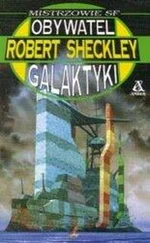Robert Sheckley - Redfern's Labyrinth
Здесь есть возможность читать онлайн «Robert Sheckley - Redfern's Labyrinth» весь текст электронной книги совершенно бесплатно (целиком полную версию без сокращений). В некоторых случаях можно слушать аудио, скачать через торрент в формате fb2 и присутствует краткое содержание. Жанр: Фантастика и фэнтези, на английском языке. Описание произведения, (предисловие) а так же отзывы посетителей доступны на портале библиотеки ЛибКат.
- Название:Redfern's Labyrinth
- Автор:
- Жанр:
- Год:неизвестен
- ISBN:нет данных
- Рейтинг книги:3 / 5. Голосов: 1
-
Избранное:Добавить в избранное
- Отзывы:
-
Ваша оценка:
- 60
- 1
- 2
- 3
- 4
- 5
Redfern's Labyrinth: краткое содержание, описание и аннотация
Предлагаем к чтению аннотацию, описание, краткое содержание или предисловие (зависит от того, что написал сам автор книги «Redfern's Labyrinth»). Если вы не нашли необходимую информацию о книге — напишите в комментариях, мы постараемся отыскать её.
Redfern's Labyrinth — читать онлайн бесплатно полную книгу (весь текст) целиком
Ниже представлен текст книги, разбитый по страницам. Система сохранения места последней прочитанной страницы, позволяет с удобством читать онлайн бесплатно книгу «Redfern's Labyrinth», без необходимости каждый раз заново искать на чём Вы остановились. Поставьте закладку, и сможете в любой момент перейти на страницу, на которой закончили чтение.
Интервал:
Закладка:
REDFERN'S LABYRINTH
Charles Angier Redfernreceived two curious letters in his mail on an otherwise undistinguished morning. One letter was in a plain white envelope, and for a moment Redfern thought he recognized the handwriting. He opened the envelope and took out a letter with no salutation or signature. He puzzled for a while over the strange yet familiar handwriting, then recognized it as an imitation of his own. Mildly intrigued, but with a faint anticipation of boredom, he read the following:
Most of the propositions in Redfern's ineptly titled Labyrinth will doubtless go unchallenged, as no one could possibly care one way or another. Redfern's Labyrinth fails to evoke anything except Redfern's own baffled impotence. One senses that Redfern has failed to overcome his own meek and hateful slavishness, his boundless desire to comply.
Because of this resonant failure, the reader's first sensation is apt to be pointedly inconsequential: a concern with the humble brevity of the Labyrinth, and a spiteful wish that it were shorter still.
But this quickly passes, and the reader discovers that his predominant mood is a muted reluctance to feel anything at all. With gratitude he discovers himself to be indifferent. And, although he surely does not wish to remember the Labyrinth, he does not even care enough to forget it.
Thus the reader meets Redfern's boredom with an
even more devastating boredom of his own; he imitates Redfern's hostility, and easily surpasses it. He refuses even to acknowledge Redfern's existence; and to that end, he has the absentminded sensation of never having experienced the Labyrinth at all. (He is right, of course; no number of re-encounters would ever correct that eminently logical conclusion.)
This Labyrinth, it seems, could be used as an exemplary monument to tedium, were it not marred (how typical of Redfern!) by a single provocative idea.
This occurs in Proposition 113, which states: 'All men know that the Maze rules its haphazard victims with an iron law; but very few realize the logical consequences of this: namely, that the Maze itself must be one of these victims, and must therefore be equally subject to the rule of an irksome law.'
Redfern does not state the 'law', a lapse which we might have anticipated. But it can easily be inferred from his otherwise meaningless Proposition 282: 'Providence, despite all outward appearances, is inevitably merciful.'
Therefore, following Redfern: the Maze rules men, but Providence rules the Maze. How can we know this? By the law to which the Maze (in common with all things except Providence) is subject. What is this law? That the Maze is under a mandate to make itself known. Our proof of this? The fact that Redfern, the meekest and most imitative of men, knows it.
But now we wish to know exactly what this law is that governs the Maze. How must the Maze make itself known? Without a description of this, we have nothing; and Redfern is useless to us in this quest. He cannot tell us, he probably would not even if he could. Therefore, for the description of the law which circumscribes the Maze, its particular manner and form, together with several homely hints to aid in its recognition, we turn to the otherwise undistinguished Charles Angier Redfern.
Redfern put down the letter. Its forced ambiguities had bored him. Its specious and arbitrary manner and its generally meretricious effect had given him the curiously comforting sensation that one gets by discovering as a falsehood what one had suspected as truth. He turned to the second letter.
The envelope was unnaturally long and narrow, and coloured a tedious aqua; it retained a faint but unmistakable odour of kelp. His name, printed in a faded, machine-simulated hand, was correctly spelled; but his address was incorrectly given as 132 Bruckner Boulevard. That had been crossed out, and a printed imitation of a post-office stamp read: 'Return to Sender'. (There was no return address on the envelope.) That, in turn, had been slashed with a black crayon, and someone had written: 'Try 137 W. 12th Street', which was his true address.
Redfern realized that these details were superfluous; they seemed to be in imitation of the letter within. He opened the envelope and extracted the letter, which was written gratuitously on a torn piece of brown wrapping paper. It read:
hi there! ! !
You have been selected as one of those few truly modern and discerning people for whom novelty outweighs apprehension, and whose desire for the unusual is metered only by his innate good taste and sense of style. Above all we believe that youare the sort of uninhibited free-swinger with whom we would like to be friends.
Therefore we take this opportunity of inviting you to the GRAND OPENINGof Our LABYRINTH! ! ! ! !
This Labyrinth (the only one of its kind on the Eastern Seaboard) is, needless to say, replete with kicks. There are no squares on our curves! ! ! This Labyrinth beggars the description and infantilizes the desires.
Please call us and we'll arrange a time and place of Entrance to suit your convenience. Our charges are merely life, liberty, and the pursuit of happiness.
Call us soon, hear? and thanks a lot, fella ! ! ! !
Instead of a signature there was a telephone number.
Redfern flicked the letter regretfully in his hand. It was obviously the work of an over-eager English major - tediously hip, drearily cute.
The writer of the letter was obviously trying to perpetrate a hoax; therefore, Redfern decided to hoax the hoaxer through a show of credence. He picked up the telephone and dialled the number he had been given.
The voice of a middle-aged woman, querulous but resigned, said: 'Redfern Behavioural Research Institute.'
Redfern frowned, cleared his throat, and said, 'I am calling to inquire about the Labyrinth.'
'About the whatV the woman said.
'The Labyrinth.'
'What number are you calling?'
Redfern told her. The woman agreed that he had the correct number for the Redfern Institute; but she knew nothing about any Labyrinth. Unless, of course, he was referring to the well-known L Series of mazes, which were used for the testing of rats. The L Series mazes, she went on, were available in various models and were priced according to their square footage. They ranged from the L-1001. a simple forced-choice binary maze of twenty-five square feet, all the way up to the L-10023, a multiple-choice random-selection model of nine hundred square feet, suitable for auditorium viewing.
'No,' Redfern said, 'I'm afraid that wasn't exactly the sort of thing I had in mind.'
'Then what exactly did you have in mind?' the woman asked. 'We also build custom mazes, as our advertisement in the Yellow Pages points out.'
'But I don't want you to build a maze for me,' Redfern said. 'You see, according to the letter I received this Labyrinth, or maze, is already in existence and seems to be quite extensive in size and to have been designed for humans, that is to say, for people.'
'Just exactly what are you talking about?' the woman asked, in tones of deepest suspicion.
Redfern found himself babbling: 'It's this letter I received. I've been invited to the grand opening of this Labyrinth, which gave your telephone number for further information—'
'Listen, mister,' the woman interrupted in an angry, grating voice, 'I don't know if you're some kind of nut or if this is some kind of gag or what, but the Redfern Institute is a respectable business of over thirty-five years standing, and if you bother me again with this nonsense, I'll have this call traced and you will be prosecuted to the fullest extent of the law!'
Читать дальшеИнтервал:
Закладка:
Похожие книги на «Redfern's Labyrinth»
Представляем Вашему вниманию похожие книги на «Redfern's Labyrinth» списком для выбора. Мы отобрали схожую по названию и смыслу литературу в надежде предоставить читателям больше вариантов отыскать новые, интересные, ещё непрочитанные произведения.
Обсуждение, отзывы о книге «Redfern's Labyrinth» и просто собственные мнения читателей. Оставьте ваши комментарии, напишите, что Вы думаете о произведении, его смысле или главных героях. Укажите что конкретно понравилось, а что нет, и почему Вы так считаете.







